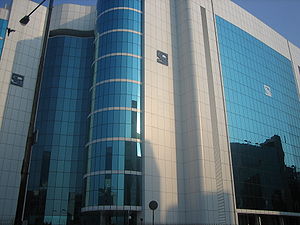Securities and Exchange Board of India
by Rekha[ Edit ] 2009-11-13 15:30:34
Securities and Exchange Board of India
SEBI is the regulator for the Securities Market in India. Originally set up by the Government of India in 1988, it acquired statutory form in 1992 with SEBI Act 1992 being passed by the Indian Parliament.Chaired by C B Bhave, SEBI is headquartered in the popular business district of Bandra-Kurla complex in Mumbai, and has Northern, Eastern, Southern and Western regional offices in New Delhi, Kolkata, Chennai and Ahmedabad.

The Board comprises,
| Name | Designation | As per |
| Mr CB Bhave | Chairman SEBI | CHAIRMAN (S.4(1)(a) of the SEBI Act, 1992) |
| Mr KP Krishnan | Joint Secretary, Ministry of Finance | Member (S.4(1)(b) of the SEBI Act, 1992) |
| Mr Anurag Goel | Secretary, Ministry of Corporate Affairs | Member (S.4(1)(b) of the SEBI Act, 1992) |
| Dr G Mohan Gopal | Director, National Judicial Academy, Bhopal | Member (S.4(1)(d) of the SEBI Act, 1992) |
| Mr MS Sahoo | Whole Time Member, SEBI | Member (S.4(1)(d) of the SEBI Act, 1992) |
| Dr KM Abraham | Whole Time Member, SEBI | Member (S.4(1)(d) of the SEBI Act, 1992) |
| Mr Mohandas Pai | Director, Infosys | Member (S.4(1)(d) of the SEBI Act, 1992) |
| Mr Prashant Saran | Whole Time Member, SEBI | Member (S.4(1)(d) of the SEBI Act, 1992) |
Functions and Responsibilities
SEBI has to be responsive to the needs of three groups, which constitute the market:
* the issuers of securities
* the investors
* the market intermediaries.
SEBI has three functions rolled into one body quasi-legislative, quasi-judicial and quasi-executive. It drafts regulations in its legislative capacity, it conducts investigation and enforcement action in its executive function and it passes rulings and orders in its judicial capacity. Though this makes it very powerful, there is an appeals process to create accountability. There is a Securities Appellate Tribunal which is a three member tribunal and is presently headed by a former Chief Justice of a High court - Mr. Justice NK Sodhi. A second appeal lies directly to the Supreme Court.
SEBI has enjoyed success as a regulator by pushing systemic reforms aggressively and successively (e.g. the quick movement towards making the markets electronic and paperless rolling settlement on T+2 basis). SEBI has been active in setting up the regulations as required under law.
SEBI has also been instrumental in taking quick and effective steps in light of the global meltdown and the Satyam fiasco.It had increased the extent and quantity of disclosures to be made by indian corporate promoters. More recently, inlight of the global meltdown,it liberalised the takeover code to facilitate investments by removing regulatory structures.
